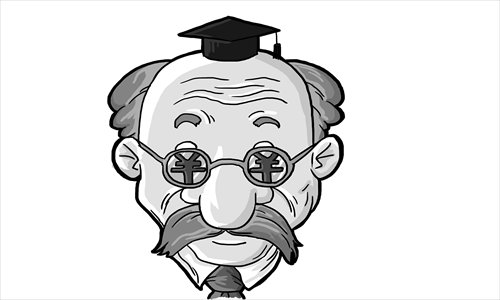Pay bumps can bring professors back

There're certain complaints which are pretty much universal in academia; not enough money, not enough time, too much marking, and too many bureaucrats. But Chinese professors have more reasons to complain about the first than most, since academic pay in the nation is so appallingly low.
For instance, the formal pay packet of a Tsinghua or Beida (Peking University) professor, even a senior one, hovers somewhere around 6,000 to 8,000 yuan ($940 to $1,260) a month. At second or third tier universities, starting pay can be as low as 2,000 yuan monthly.
Compare this to the US, where the average professorial salary for full-time staff is around $80,000 yearly, according to figures from the Chronicle of Higher Education.
A full professor at an Ivy League institution in the US, averages around $190,000, nearly 20 times what his or her counterpart at Tsinghua or Beida is raking in.
Of course, China's per capita GDP is barely 10 percent of the US. But that includes the country's huge rural areas and migrant workers. Professional salaries normally hover at around a quarter to one-third of their US equivalents, especially in the big cities.
Why are China's professors so poorly compensated by comparison?
One answer is that their nominal pay packets are a fraction of what they actually earn. Some of this comes in the form of acceptable benefits, such as cheap housing, health insurance, and schooling for kids, that foreign professors also enjoy. But a lot more falls into a much greyer area.
Take an acquaintance of mine at a prominent university in Shanghai. Every month he earns just over 2,000 yuan formally, but he is also in charge of book purchases at his research center. This takes his real income to close to 10,000 yuan in skimmed-off funds and kickbacks from publishers to purchase their textbooks.
For professors, outside funding, often from US institutions, has become a major source of income. One acquaintance at a top Chinese university quadruples his nominal earnings through grant money and the like.
Meanwhile, many senior staff moonlight as consultants for outside firms, often putting more effort into that than actual teaching. One junior professor at a college in Hebei Province estimated to me that he spent as little as 20 percent of his time on college business.
Control of funding and side gigs for teachers are also major issues in other countries, but it doesn't take up anywhere near as much time or make up as substantial a part of academics' pay as in China.
If this is how professors get by, why is it so damaging? To start with, it sets a terrible example for students. If they see their teachers using dodgy means just to make a living, what lesson will they learn about how China works?
It's also damaging to the integrity and scholarship of the universities. If professors are spending their time on private business or wheedling out ways to take their pay packets to acceptable levels, they're not doing the research and teaching that make institutions great. And with senior professors often spending more time on private work than their supposed research, junior staff and graduate students find themselves under pressure to do their supervisors' research for them.
PhD students in many schools are treated as little more than unpaid labor for the professors, with the expectation that they will treat their own students the same way if they make it to the top. And with this pressure on them, they're more likely to turn to the plagiarism or faking of results that have tragically marred so much academic work in China. It's no wonder talent escapes to foreign universities whenever possible.
This problem isn't unique to the universities. A similar dilemma is found among other public-sector professionals such as doctors. Any solution needs to be two-pronged; significantly raise actual salaries, while simultaneously cracking down on grey income and putting tighter supervision on teaching and research. That's the only way China's universities, which currently hold a miserably low status in global academic rankings, can reach the level that the country, and students, deserve.|
The author is a copy editor with the Global Times. jamespalmer@globaltimes.com.cn